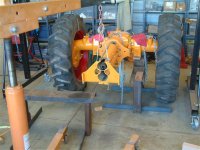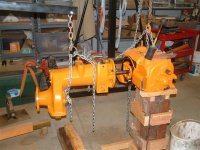tessiers
Platinum Member
- Joined
- Sep 22, 2007
- Messages
- 728
- Location
- Central Maine
- Tractor
- 05' JD 790 - 53' Ford NAA - 70' Massey Fergusen 135 diesel - 67' John Deere 3020 deisel - 77' John Deere 2130 - 1950 John Deere MC
I run some old tractors on my small farm. Hay is about as time sensitive as you can get, and I trust them as much as my new (2005) tractor. I do a few minor things to them from time to time, but no more than the newer equipment, and the cost is much lower. I will say this, I am a tinkerer at heart and do not get intimidated by working on equipment, if you are not handy find a good dealer weather you buy old or new. I have a local dealer who still treats my 53' Ford like I bought it last week, actually they deal in most of the equipment I have. I do most of my own work but they get parts unbelievablly quick for the old equipment.
I agree the two biggest cons are fuel, the old tractors are thirsty, and comfort, they were built for work and you came home tired and dirty to prove it. I have a theory that just because a tractor has survived 50+ years may not mean it was a good model but it does means it must be a good tractor, otherwise it would have been parted out or scrapped long ago. The theory has proven true with my equipment anyway.
Good luck in your endevor.
I agree the two biggest cons are fuel, the old tractors are thirsty, and comfort, they were built for work and you came home tired and dirty to prove it. I have a theory that just because a tractor has survived 50+ years may not mean it was a good model but it does means it must be a good tractor, otherwise it would have been parted out or scrapped long ago. The theory has proven true with my equipment anyway.
Good luck in your endevor.


